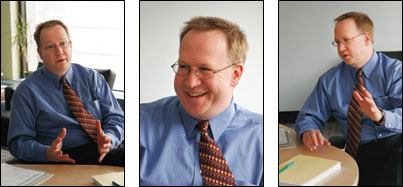
Peter Todd's research interests include the role of information technology in decision making.
Owen Egan
Entre Nous with Peter Todd, Dean of Management
Big bucks for broad-minded business
Peter Todd has excellent timing. He left his position as senior associate dean at the McIntire School of Commerce at the University of Virginia to become dean of McGill's management faculty in July 2005. Not much later - on November 17, to be precise - the faculty announced a $22 million gift from Marcel Desautels and his Canadian Credit Management Foundation. As a result, Todd, who received his McGill BCom in 1983, will lead the newly named Desautels Faculty of Management of McGill University through an era of profound transformation.
Most of the Desautels gift is directed toward endowed projects. How will this money change the faculty?
Marcel Desautels wanted to help the faculty by supporting what we wanted to do, and so most of the gift goes to our central need: investments in people. We have funding for three chairs, enabling us to recruit top scholars from across the world, and a significant amount for faculty scholar awards, helping us attract and retain the best young professors. This is timely, as we expect to grow from 45 to 60 faculty members over the next three years, and are recruiting for six positions right now. The gift also includes endowments for visiting scholars, for an annual symposium, and for student support, including both scholarships and student organizations and activities. Finally, we have funds we can use to upgrade our physical facilities. So the gift will boost us tremendously in our mission of providing the best environment for research and teaching.
How does the faculty interpret this mission?
This faculty has always taken the broad view that business is about more than the bottom line, and that it has obligations to a wide range of stakeholders when you consider its roles in society as well as the economy. And within the faculty we've always had an interdisciplinary sensibility. We have professors trained as psychologists, historians, sociologists as well as economists and specialists in finance, marketing, and accounting, and all of them are applying their intellectual tools to questions of business and management. But our broader perspective also comes from our students. For instance, recently students held a conference on sustainability, and around the same time they hosted a community experience career fair, as many take internships in non-profit community organizations. We've always had that tendency in our bones.
We're also developing stronger connections with other faculties. For instance, almost a quarter of our faculty research is related to the interface between health care and management. It's becoming essential to work with experts from different faculties when trying to tackle the big problems of today, whether those are the big problems of business and commerce or the even bigger societal problems that business issues are part of.
You have said you want to see the faculty become the best management school in the country. What will that take?
Being the best management school is about pushing the envelope in terms of research, questioning and challenging assumptions. It's also about developing very innovative programs to teach management and business to students - so our research involves questioning traditional management educational practices as well. And we must be doing both those things in ways that build a strong connection to the business community. We have all three of these elements in play, and we are also unique because of our focus on the role of business in society. Being the best business school in Canada is a good goal for us to start with, but we also want to measure ourselves against the best in the world. However good we become, we will always have to keep pushing forward
Peter Todd's First Job: A Solid Foundation
My brother and I were the first in our family to go to university, and I worked my way through McGill by shoveling cement in a factory. Other than paper routes, that was my first real job. I was a member of the United Cement Lime and Gypsum Workers. Eight hours a day of day shoveling cement, working through summers on the end of a jackhammer and not being able to open your hands at the end of the day, gave me a sense of the value of education.

